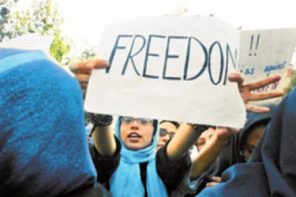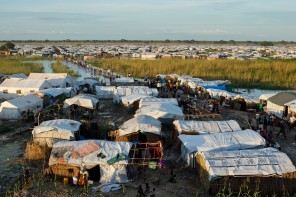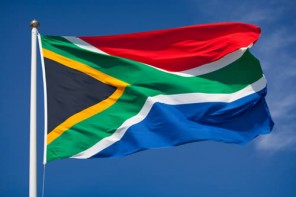The International Criminal Court issued a warrant for the arrest of Omar al-Bashir, the president of Sudan. After the usual politicking in the halls of the United Nations and elsewhere, the Court decided to issue the warrant, despite strong words for the ICC from Bashir himself: “They can eat it,” he said Tuesday.
The International Crisis Group yesterday “examine[d] the consequences of his indictment for crimes against humanity and war crimes, both for Sudan and for the international community.” Does the circuity of this bother anyone else? ICG is concerned about how the warrant, executed for charges of (among other things) crimes against humanity, affects…crimes against humanity? Put more abstractly, ICG is concerned about the consequences of a legal tool on a legal category. If I were this cynical–and I don’t think I am–I might say this sounds like lawyers’ speak for, “What’s in it for us?”
There is a very nicely written blurb from the group’s deputy president that says this is a “landmark” for “millions of Darfuri victims.” Which is to say, there may also be “consequences” in the world in which ordinary people live. And that, these days, ain’t something to sneeze at.
The slightly less cerebral Save Darfur coalition asks its email list to consider something more practical: money. Namely, theirs. In a well-scripted game of transitive guilt, they manage to turn the warrant into a fundraising plea.
Dear j,
It’s official: the International Criminal Court has issued a warrant for the arrest of Sudan’s President Bashir.
Bashir could now face the full weight of international law. But he could also respond by lashing out more viciously than ever against Darfuri civilians.
In the critical coming days, we’ll pressure President Obama to ensure that Darfuris are protected and peace efforts are redoubled. And we’ll lean on world leaders to bring Bashir to justice. But j, we can’t do it without you.
Give now and ensure we have maximum influence at this game-changing moment.
As an ordinary email reader, I stopped reading there. But a responsible inquisition demands a follow up question, namely, “What influence?”
Save Darfur says they want my money to do more media outreach, to lobby the US government and the UN Security Council to make sure civilians are/stay protected post-warrant, and to “keep the heat” on Obama to appoint an envoy “with the stature, mandate and authority to stabilize the region.”
Of course, being a member of the media (and happy to reverse the charges if Save Darfur wants to reach out to me with a phone call), I can’t give money to them no matter what I think. And here’s what I think: They’re damned right to be worried about the protection of civilians in the wake of this very muscular move. But if, after 5 years, the international community hasn’t figured out how to protect Darfuris, what does Save Darfur really think we can do now?
As for the envoy…show me someone who fits that description–which is a fancy way of saying, “a man who can single-handedly bring peace to Sudan!”–and I’ll get behind him. (And yes, I’ll put money on it being a “him.”)
None of this is to say we don’t need sustained attention to what’s happening in Sudan. We do. And I think we need a certain kind of advocacy; I’m just not sure this sort of email is it.




Really enjoy your blog. I think the fears of most people are in the wrong place. Instead of worrying about what will happen to Darfuris now that the warrant has been issued we should really focus on what atrocities may continue if Bashir is not arrested.
http://www.ricoexplainsitall.com/politcs-economy/2009/3/6/bashir-responds-to-icc-arrest-warrant.html
Hi Rico, thanks for the comment. I think you make an excellent point: it’s not as if Bashir were building houses and starting job-training programs for Darfuris. They’re still in danger, arrest warrant or no.
I zipped on over to your blog and read your very interesting take on the matter. You raise the issue of nationalism vs. statehood as a contributing factor in Africa’s conflicts. On the one hand, you’re right–it’s destructive. On the other, it’s yet another colonial legacy, right? I mean, the British drew the borders of Sudan, and that’s what they left behind. On one level, these difficulties–from Sudan to DRC to Rwanda in 1994 and beyond–are about who gets to be a citizen in the leftover post-colonial state, and who doesn’t. They’re about interpreting ‘statehood.’ (I’m totally cribbing this, of course, from Mahmood Mamdani’s “Citizen and Subject.”)
What do you think?